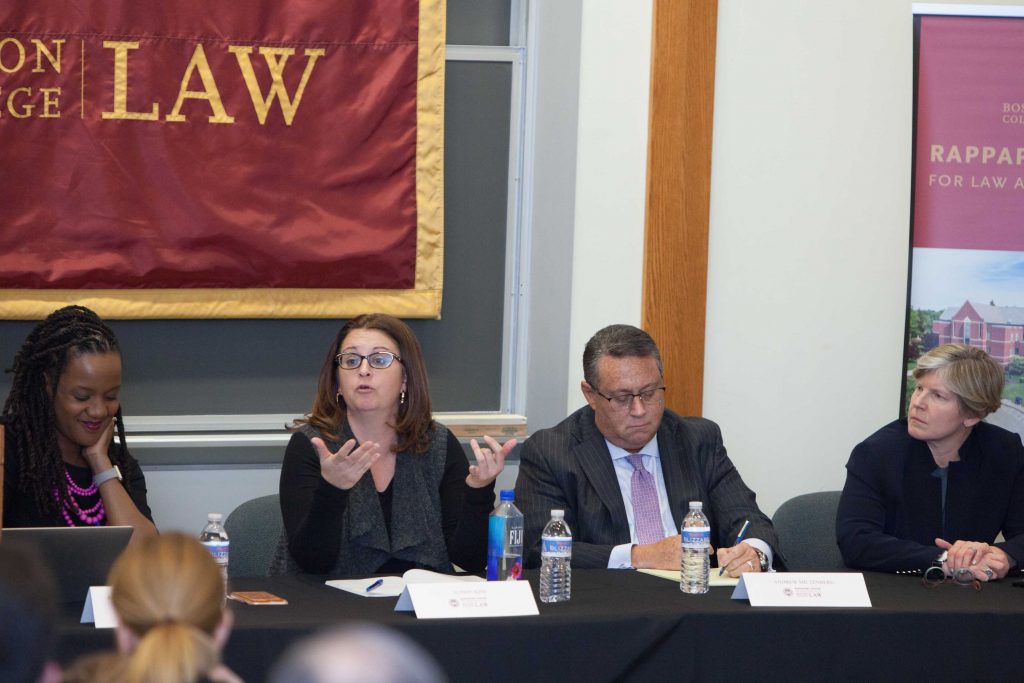In 1972, the US government enacted Title IX, which was aimed at preventing gender discrimination within educational institutions that receive federal financial assistance. While the law initially increased access to athletic programs for women, it also grew to become the primary legal vehicle shaping the treatment of sexual assault on campuses across the country.
The Rappaport Center for Law and Public Policy convened a panel at BC Law on February 28 to discuss the impact of this policy on institutional disciplinary processes regarding sexual assault.
Each panelist approached the subject from a distinct perspective. Régine Michelle Jean-Charles, associate professor of Romance languages and literatures & African and African diaspora studies at Boston College, sat down with panelists Alison Kiss, executive director of the Clery Center, a national campus safety resource founded by the parents of a student who was raped and murdered; Nesenoff & Miltenberg attorney Andrew Miltenberg, known for his defenses of male college students accused of sexual assault; and Lisa A. Tenerowicz, associate general counsel at Boston University, who deals with the issue on her campus.
From her decades of work in advocacy, representation, and training in sexual behavior, Kiss provided an eye-opening glimpse at the challenges facing victims. Tenerowicz revealed the hurdles that colleges and universities have to overcome in designing and implementing a fair process for both accusers and the accused within a tight-knit educational community of young adults. And, Miltenberg contributed insight into the devastating impact that an inadequate system can have on the lives of all parties involved. He described this moment in time as a “perfect storm,” with “a groundswell of people making complaints, a vague process that is not easy to navigate and not well-staffed, and universities with an undefined role.”
The discussion began with the controversial “Dear Colleague” letter issued by the Obama administration in 2011 that reinterpreted Title IX by providing guidelines on how to deal with sexual assault to all 7,000 educational institutions receiving federal funding. The executive action was rescinded last year. Regardless, universities and colleges are still trying to untangle the legal, cultural, and behavioral complexities they face when dealing with these matters. “I believe many campuses took the letter to mean that we have to be victim-centered,” said Kiss, “but the more proper goal was to have fair process that is transparent to both sides.”
BU’s Tenerowicz concurred. “It is very important for institutions to have policies in place that appreciate that both the victim and the respondent are young members of our community,” she said.
Sensitivity to students’ age and emotional well-being are major factors in how sexual assault cases are handled, Miltenberg added. Many students, he noted, “don’t have the maturity to navigate complex emotional issues, and that aspect of the tumult that you see is significant.”
Worse, some don’t even know how to identify what’s occurred. “Many will describe a sexual encounter, and it was rape, and they didn’t even know,” Kiss said. She sees this as an indicator of the need for better sex education throughout the school system, and since Title IX applies not only to higher education but also to grades K-12, serious efforts should begin in the early years.
The panelists discussed other issues at play, among them longstanding cultural factors like alcohol abuse—“if you took alcohol out of the equation, three-quarters of cases would disappear,” Miltenberg said—and newly emerging factors like social media and the #MeToo movement.
Although a single blanket resolution is still seemingly out of reach, the panelists agreed that procedures are becoming more effective as institutions develop familiarity with sexual assault and focus on transparency and fairness as the primary goals. Prevention is also key. Kiss gave the example of bystander intervention, in which students are trained how to effectively neutralize worrisome encounters, as a step in that direction.
Photo from left: Regine Michelle Jean-Charles, Alison Kiss, Andrew Miltenberg, Lisa A. Tenerowicz


